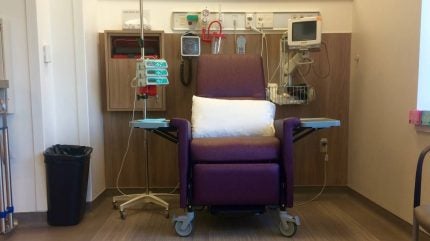
MSD’s subcutaneous (SC) Keytruda (pembrolizumab) has shown non-inferior pharmacokinetics (PK) to the intravenous (IV) version of the company’s blockbuster therapy in a pivotal trial.
The ongoing, randomised, open-label Phase III 3475A-D77 trial (NCT05722015) investigating SC Keytruda delivered every six weeks met its primary endpoint demonstrating non-inferior PK when administered with chemotherapy with a median injection time of two minutes in patients with metastatic non-small cell lung cancer (NSCLC).

Discover B2B Marketing That Performs
Combine business intelligence and editorial excellence to reach engaged professionals across 36 leading media platforms.
The therapy also reduced the amount of time patients spend receiving chemotherapy treatment by 49.7% compared with IV Keytruda.
At the same time, secondary objectives comparing objective response rate (ORR), progression-free survival (PFS) and duration of response (DOR) were consistent with intravenous (IV) Keytruda chemotherapy.
Based on this data, the US Food and Drug Administration (FDA) has accepted a biologics licence application (BLA) for SC Keytruda. A Prescription Drug User Fee Act (PDUFA) date has been set for 23 September. The European Medicines Agency (EMA) has validated an extension application for the SC version of the therapy.
Reducing the amount of time chemotherapy patients spend receiving treatment has a number of ancillary benefits, including a reduction in time spent by clinicians working with a single patient. Results from the 3475A-D77 trial saw an additional 45.7% reduction in the amount of time healthcare workers would spend with each patient.

US Tariffs are shifting - will you react or anticipate?
Don’t let policy changes catch you off guard. Stay proactive with real-time data and expert analysis.
By GlobalDataThese results were presented as part of the European Lung Cancer Congress (ELCC) 2025 currently taking place in Paris.
MSD’s senior vice president and head of oncology Marjorie Green said: “If approved, we are excited about the potential of SC Keytruda to become a new meaningful treatment option that may increase access and save time needed for administration compared to IV Keytruda.
“We look forward to working with global regulatory authorities to bring the first SC checkpoint inhibitor that can be administered in approximately two minutes to patients and providers.”
MSD’s Phase III 3475A-D77 recruited 377 patients from 110 locations internationally, splitting them into two arms.
Among patients who received SC Keytruda with chemotherapy Grade III or above adverse events (AEs) occurred in 47% of patients versus 47.6% of patients who received IV Keytruda with chemotherapy.
Within the past few years, several companies and therapies have made the shift towards SC formulations, in large part due to their ease of use, design and production over intravenous methods.
Whilst IV Keytruda is present across a myriad of oncology indications, from kidney cancer to oesophageal cancer, GlobalData’s Pharmaceutical Intelligence Center estimates that the drug’s consistent growth in revenue won’t last forever as generic versions of the drug become available. By the end of 2029, Keytruda’s yearly sales are expected to peak at $15.6bn before steadily dropping down to $13bn by 2030, then further to $9.8bn by the end of 2031.
GlobalData is the parent company of Clinical Trials Arena.
Elsewhere in the field of therapies utilising MSD’s Keytruda, Mural Oncology is discontinuing the development of nemvaleukin alfa in ovarian cancer after a Phase III trial failed to improve overall survival (OS).




